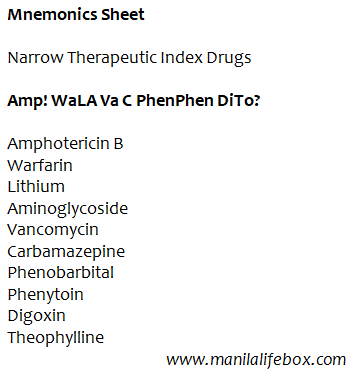So as I was studying for the 2019 Physician Licensure Examination or PLE, I made it a point to make drafts of some of the things I learned that I can immediately recall from the notes and tables I got during my review period.
Writing this here somehow enabled me to at least aggregate what I know and identify the weak areas that I still need to be familiar with to better prepare myself for the Pharmacology part of the PLE. Please take note that I was just an average performing student in school, but at this moment, I tried to catch up on the lessons and at the same time, aimed to be helpful to others given the limited knowledge and resources that I have.
Today's topic is about drugs used in congestive heart failure (CHF).
Side note:
- Left-sided heart failure will usually present with orthopnea, pulmonary congestion and paroxysmal nocturnal dyspnea
- Right-sided heart failure will come with symptoms of bipedal edema, neck vein engorgement, and hepatomegaly.
Some points to remember:
- Because the heart is failing, cardiac output is decreased relative to the requirement of the body.
- So the goals is to either
- Push the heart to contract stronger (positive inotropes)
- To lower the resistance the heart must pump against (also called afterload) for less stress (vasodilators)
- Use other drugs to help alleviate accompanying heart failure symptoms
Enlisted below are the drugs used in congestive heart failure (CHF). Please do note that I only included what I feel are important or must-knows, given that I only have a limited amount of time. Take these with a grain of salt.
POSITIVE INOTROPES
1. Cardiac Glycoside (DIGOXIN)
MOA: inhibits Na-K ATPase, increases contractility
Side effects: narrow therapeutic index, arrhythmia, yellow halos
Note: arrhythmogenesis risk increases with HYPOKALEMIA (from use of loop diuretics or thiazides), HYPOMAGNESEMIA, HYPERCALCEMIA
Mnemonics: Narrow Therapeutic Index Drugs
2. Beta-agonist (DOPAMINE, DOBUTAMINE)
Note: useful in ACUTE heart failure, not recommended in CHRONIC heart failure due to arrhythmogenic effects
3, PDE inhibitors (MILRINONE)
MOA: inhibits phosphodiesterase breakdown, increases cAMP, vasodilation
Side effects: bronchospasm, HYPOKALEMIA
Note: acts as an "ino-lator" (inotropes + vasodilator), increases morbidity and mortality in CHRONIC heart failure patients
VASODILATORS
1, NITROGLYCERIN, NITROPRUSSIDE - for ACUTE severe heart failure WiTH CONGESTION
2. HYDRALAZINE, ISOSORBIDE DINITRATE - reduces mortality in African Americans
Note: ISDN should not be taken with PDE inhibitor Sildenafil to prevent severe hypotension
OTHER IMPORTANT DRUGS
1. Ace inhibitors (-PRILS) and ARBs (-SARTANS) - FIRST LINE for CHRONIC heart failure
Note: Valsartan usually combined with SACUBITRIL (when activated, inhibits neprilysin, an enzyme that degrades BP-lowering peptides, in effect, lowering the BP)
2. Diuretics - first line for ACUTE and CHRONIC heart failure (systolic and diastolic)
- FUROSEMIDE - loop diuretic, used to immediately address pulmonary congestion and severe bipedal edema, WOF hypokalemia
- SPINOROLACTONE - K-sparing diuretic, acts as an non-selective aldosterone antagonist via competitive inhibition at the DCT, reduced mortality in CHRONIC CHF when added to loop diuretics
3. Beta blockers (-OLOLs) - slows progression of CHRONIC CHF, NOT useful in ACUTE CHF
4. Brain Natriuretic Peptide (BNP) analog (NESIRITIDE) - for ACUTE DECOMPENSATED heart failure
Note: BNP is secreted by the cardiomyocytes in response to ventricule stretch from increased ventricular blood volume
Mnemonics: Drugs that Improve Survival in chronic Heart Failure
I guess that's it. If I ever committed any mistake here, please let me know. I am no expert on these matters. Just like you, I've gone through the strenuous, anxiety-inducing days of the review. I just jotted down what I learned from my Topnotch lecturers and reviewer notes. Hope this short review on CHF drugs has helped you in some way.
Don't be scared. Carry on. :) Check out this brief PLE Pharmacology review on Anti-arrhythmic drugs.














